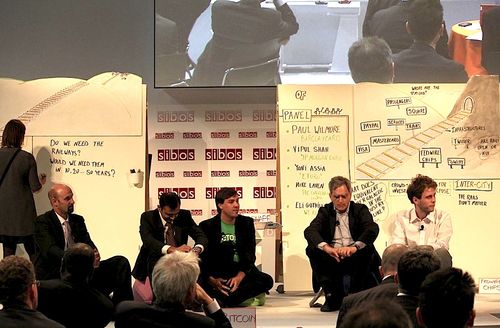
At SIBOS 2012, I led a session on the
future of money along with Udayan Goyal ...

... and asked the basic question: will the future still be built on
the banking foundation?
I'm writing up the session again, as my original description left out a core conclusion about the need to adapt to the future and not let the future happen to you.
The session asked whether banks would be needed in the future and used the metaphor of whether the future would be based on or off the rails,
using the similarity between the railway system and the banking system.
The railway system has operators of
services and core infrastructure. The
operators have been competitive for a while now, but the core railway
infrastructure is heavily regulated, audited and checked for health and
safety. As a result, providing core
infrastructure is not an area that many want to get into, as it is costly with high barriers to entry. Competing on
the rails however is simpler and has far more potential.
This is the nature of how we could see the
banking world.
The core infrastructures – the rails – are
things like SWIFT, Visa, EBA STEP2, ECB TARGET2 and more.
The operators on the rails are the banks
themselves, but also others such as payments processing operators like
Earthport, PayPal and Western Union.
You could add a few more in there – maybe
station managers of stops along the way – such as Simple and Movenbank.
This means that most banks believe the
future will never change as everyone needs to use the core infrastructure to
operate, a structure that is licensed and regulated heavily and that has been
built over many years to provide a global transaction processing service for
money. This is why the future will
always be with the banks as, to transact commercially, you need a bank in the
process somewhere because banks are licensed and regulated.
This is where it gets interesting: will we
have a future world run on the banking system, or will others disrupt and
change this?

So far, no-one has.
We often cite PayPal as being the
disruptor, but PayPal has not disrupted anything yet. PayPal sits on top of the banking system, it
has not replaced it. PayPal adds a fee
to the transaction process, it does not reduce fees.
So nothing has gone off the banking rails
yet.
Bitcoin is an example of something that is
going off the rails, but it has not yet reached a critical mass to be of
interest to the core banking system and, if it did reach such critical mass,
then the view would be that it could be acquired, migrated and integrated into
the traditional system.
So, in other words, the future will be
different, but the same and here goes the logic.
The banking system is a system that
requires stability, resilience, security, safety and confidence that it works.
This system runs most economies and
commercial capabilities of countries.
Without it therefore, economies and countries would collapse and
decline.
This is why the system is so heavily
regulated and managed, to ensure it delvers that security , safety and
confidence in the system.
Any new operators will therefore either be
part of the core infrastructure – the rails – or part of the service that runs
on top of the system – the operators.
The latter can fail but the former cannot.
Therefore, if you are part of the rails and
railway management, you can have confidence that no-one will ever eat your
lunch as you have no-one who can threaten your position.
This is where it gets slightly confusing
however, as some banks see themselves as rails rather than operators.
They have a false sense of confidence in
their future, as they believe they are the ones protected.
This has been true for some historically
but, as we look to the future, it will not be the case in ten years time.
In ten years, the ‘too big to fail’ lessons
will have been learned, the ring fencing of investment and retail banking will
be in place, a Glass-Steagall world will have returned, and another hiccup in
the system will see banks allowed to fail.
Ten years from now, the encouragement of
competition, the removal of barriers to entry from some parts of banking and
the enthusiasm of government to be directly involved in bank operations will
have changed the game for (some) banks.
By 2022, technology will have moved on at a
far greater pace and we will see all things connected wirelessly. Transactions will occur without customers
taking action; they will just be transmitted wirelessly and in real time.
In 2022, new banks will be appearing
overnight, but they won’t be banks. They
will be transmitters, exchangers, processors and communicators. Many will be enabling commerce, but some will
be facilitating communities. All of them
will be offering a service, some of which is financial whilst some if
non-financial and just exchanging virtual units of value, music, entertainment
and ideas.
Whatever … the world of tomorrow is still
being created but that false sense of confidence that it will all be on the old
banking rails and controlled by banks is a combination of two big issues: pride
and complacency.
Both of which will lead to a downfall if
not contained.
As someone pointed out: what if I’m in an
aircraft and don’t need railways?
Chris M Skinner
Chris Skinner is best known as an independent commentator on the financial markets through his blog, TheFinanser.com, as author of the bestselling book Digital Bank, and Chair of the European networking forum the Financial Services Club. He has been voted one of the most influential people in banking by The Financial Brand (as well as one of the best blogs), a FinTech Titan (Next Bank), one of the Fintech Leaders you need to follow (City AM, Deluxe and Jax Finance), as well as one of the Top 40 most influential people in financial technology by the Wall Street Journal's Financial News. To learn more click here...

